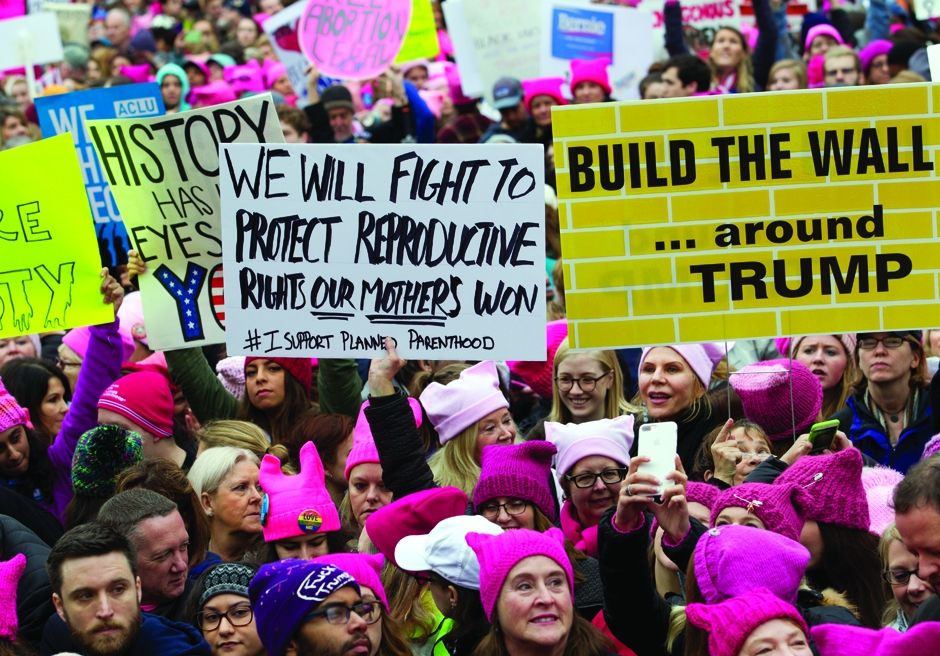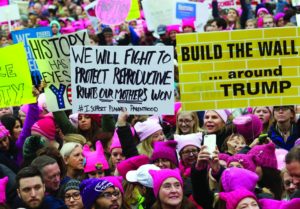
By Zachary Landau | Assistant A&E Editor

On Jan. 21, people from across the globe came out in droves to protest against President Donald Trump and his potential policies. Women led this charge, but folks of all different genders, races, creeds and colors rallied together to send the message to the new administration that they do not have the popular support.
It was a great display of solidarity, and I was elated to participate in Pittsburgh’s march. However, the black, stone-cold heart that pumps the vitriol that keeps my decrepit body moving also wants to highlight the undertones of this moment.
But first, let’s address some optics: Yes, I am a white male writing about feminism. As such, I am going to restrain from voicing as much of my own opinions here to make room for the people whose voices need to be heard. I am working primarily in opposition to white feminism.
For the uninitiated, white feminism is the critique of the mainstream idea of feminism and the popular discourse that dominates social justice circles. Specifically, it addresses the notion that the success of white, cisgendered, straight women is representative of — or more important than — the success of all who fall under the purview of feminism.
I do not wish to disparage all of the good the Women’s March did. I do want to draw attention to the possibly-implied messaging sent by the march because, unfortunately, there are a number of self-proclaimed feminists who resist the idea that feminism has to be intersectional (a problem so bad that a separate rally splintered off of the Pittsburgh’s march after conflict between event organizers and individuals demanding more inclusion of women of color and other minorities). Hopefully, by doing so, I can help broaden a few people’s understanding of feminism and bring attention to the fact that this movement is meant to help people other than the aforementioned white, straight, cis women.
Hell Hath No Fury Like White Women Scorned
The issues brought up at the marches (such as affordable access to health care, immigration, environmentalism, etc.) were all problems that everyone should care about. However, these are also issues that people of color have been demanding politicians to address for decades. They historically are the ones statistically at-risk if progressive solutions to these issues are not implemented. But, it was only when white women’s investment in these issues was threatened (such as losing health care coverage through the Affordable Care Act) did we start losing our minds. There is a selfish undertone to this: When black or Hispanic women’s access to health care is threatened, it is just par for the course. But as soon as white women can’t have an affordable doctor, then we’ll show solidarity.
This is to say nothing about how women did not start turning against Trump until after the tapes of him bragging about sexually assaulting women leaked, almost as if none of the other horrendous garbage he spewed throughout the primaries was not enough. Even then, 53 percent of white women who voted chose Trump.
You can see why some women of color and queer folk were hesitant to support this march.
Respect My Vagina
One of the biggest, most common messages that I saw at the Pittsburgh march (and other marches) can more-or-less be summed up as respecting women.
However, that does not give people carte blanche to dress up as a vagina. Even if it is hilarious.
It is funny to turn Trump’s words against him, and the “I grab back” signs were proof-positive of this fact. However, they are exclusionary in the way that they miss the critical point that not all women have female sexual organs. Transgender women, for example, are at risk, perhaps even more than cisgender women, under Trump’s administration. For them to rally with cisgender women under the banner of the organs they do not possess is awkward at best and grossly insensitive at worst.
Actually, Sweetie
The No. 1 criticism I heard/read/saw is Trump’s integrity. But, there are a ton of other reasons that warrant marching against the incumbent.
I would list these other reasons at this point, but we would not have enough space to publish the list in full. Suffice it to say there are a myriad of different reasons to protest against Trump.
However, there was very little talk of any other issue at the march besides respect for women and minorities. From my point of view, I think I only saw about five signs, maybe, that dealt with environmentalism. It felt like for every sign there that talked about specific issues, there were 10 affirming that, yes, degrading women is disgusting.
The point is not that respecting women and not denouncing sexual assault are wrong, but they are not the only issues at hand. There are tons of reasons to protest against Trump, but unfortunately, only one issue received mainstream attention.
I hope people realize that feminism is not a monolith. A true understanding of feminism should encompass a whole range of topics and disciplines, or, to put it more simply, it is not just white women. As the phrase goes, “It’s not feminism if it’s not intersectional.”
Again, I do not want to imply this was not the case at the Women’s March. Many women of color, immigrant women and queer folk felt welcomed at the rally, and this may be in no small part to the organizers’ deliberate efforts to bring these groups on-board. However, I want to highlight problematic areas that all feminists (including myself) need to keep in mind moving forward.




